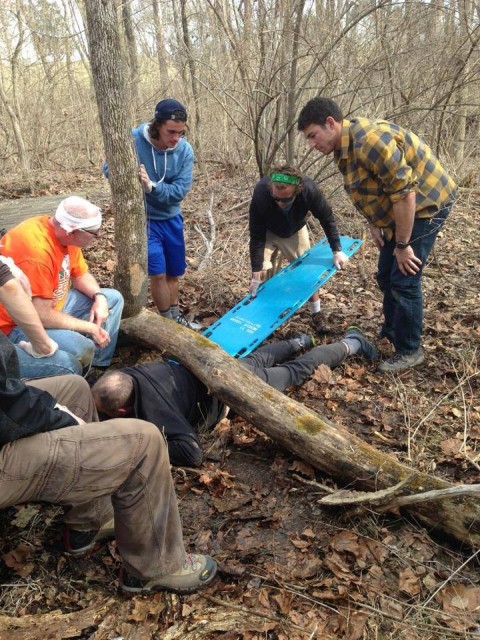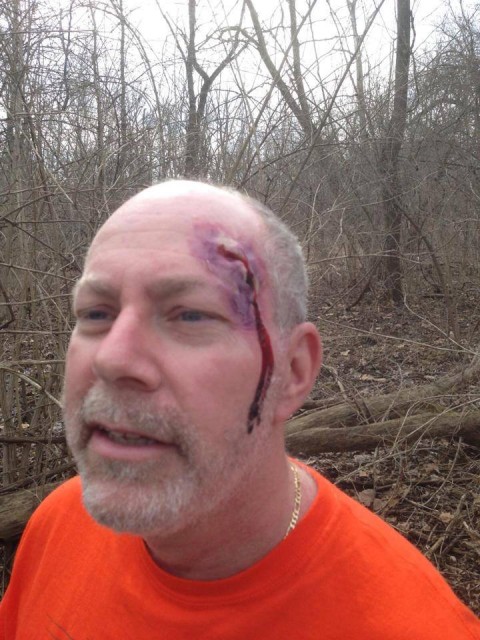Ian Roberts stood in front of a group of Boy Scout leaders and asked for a volunteer. A moment later, Jake Inclan stepped forward to volunteer and had his arm doused in a healthy quantity of fake blood. The watching students groaned a bit in sympathy. “I did warn you,” Roberts said, “that volunteering gets messier as the day goes on.”
Roberts is the co-founder and instructor for Boulder-based TrainWise, which teaches individuals the skills to deal with medical emergencies in the frontcountry and backcountry.
Roberts loves adventures. He’s an experienced spelunker and backpacker who spends a lot of time in wild, remote places. Several years back, after saving the lives of two drowning victims, he decided he needed to up his training and enroll in a wilderness first aid course.
“The course really resonated with me,” he said. In fact, it resonated so much that he soon became a Wilderness First Responder and transitioned into a wilderness medicine instructor with several organizations.
Some of the TrainWise students are simply day hikers, people who want to feel prepared for outdoor recreation. But TrainWise also teaches industry professionals such as youth group leaders, wilderness guides, camp counselors, physicians traveling to remote areas, and medical staff that work in hard-to-reach areas.
TrainWise is based in Boulder, Colorado and offers a number of courses all over the state, with a high volume in the front range of Colorado. Courses also included CPR/AED, Oxygen Administration, Bloodborne Pathogens, Leave No Trace, Archery, and more.
The skill set is different than first aid training for urban areas. If you break your arm in the city, for instance, 911 will likely get you help within minutes. If you break your arm while 20 miles from the nearest road, things are quite different.
The classes really teach people how to think creatively. Students learn how to do a thorough patient assessment and how to know what problems must be treated immediately, and what can wait.
Roberts says the course teaches people the skills that allow them to identify a life-threatening condition or injury with a very limited skill set. It also shows them how to stabilize that person while additional help is coming in.
Nina Morris of Aurora will work this summer as a wilderness ranger out of Selway-Bitterroot Wilderness. She took the class for her job.
“I will be working with the public,” she said, “and they will go to the person in the uniform if they’re hurt.”
She is also glad to have taken the class for other reasons. Last summer, long before the class, she was in a serious head-on collision. A driver crossed the centerline and hit her vehicle. She and her children were hurt in the crash. She was scared and desperate but no one came to their aid until the police arrived, she said.
If she ever comes across a similar situation, she doesn’t want to feel helpless. She now has a well-stocked first aid kit in her car. Her kit for her hiking pack has been updated now, too, after what she learned in the course.
“I’m glad to have the tools to diagnose and assess the situation rather than just walking up on a person and saying ‘Oh, you look bad,’” she said. “I feel much more prepared for whatever life could throw your way.”
Wilderness First Aid
WFA is a course designed for the average recreationist who likes to spend time in the outdoors. It’s 16 hours of instruction and covers a wide range of information including patient assessment, shock, head injuries, spinal injuries, respiratory and cardiac emergencies, allergic reactions, hypothermia, heat stroke, altitude sickness and more. The course is typically held over two days. Courses are held in Boulder, Colorado. For more information on courses, check their website , call 720-443-3463, or visit their Facebook page. Students must be 14 or older and have current Adult CPR/AED prior to the course.


